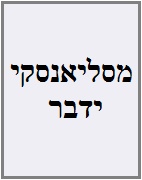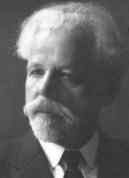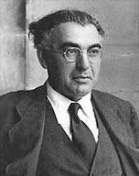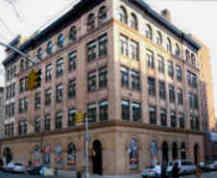|
|
|
|
|
 |
|
L-R Zvi
Hirsch Masliansky 1940. Abba Hillel Silver 1942,
Educational Alliance Building Lower East Side Just a simple sign in Yiddish Masliansky Speaks would draw crowds to hear him. |
|||
|
Master of the spoken word Guide of his generation faithful Servant of his people. Am Israel [the people of Israel] owes him much. Many of us are personally grateful to him. My own early years as a youth on the East Side of New York were frequently under the spell of his persuasive personality and his matchless oratory. There were years when I sat spellbound on the side at his invitation, for he was kind and tender to youth, Friday evening after Friday evening, and worshipfully drank in his words of passionate and lyric wisdom swayed by the moving cadences of his enkindled speeches, rising with him to the superb climaxes which he so often attained of pathos, of sorrow, of indignation and made happy by the wit, the gaiety of his lighter words. "Masliansky will speak" was a glad irresistible summons to many youth and to many older men and women who flocked here [at the Educational Alliance] and elsewhere to be uplifted, instructed and comforted to be inspired to a Sabbath mood to gain wings to see new vistas. Here came the tired heart after a back breaking weeks work in a sweatshop, peddlers and shop-keepers from the tenements, to enter another world - a finer, nobler world of ideals and ideas and aspirations. For an hour or two they could forget what is, and reach out for what was or might yet be
Here came the immigrant hovering between two worlds
a world left and one not yet entered. Confused, disturbed, wishing
for someone to recall for him the things which made him and the
world he came from significant and to interpret for him his place,
his role and his direction in a new world. His most fruitful and creative period coincided with one of the great formative periods in our history when a high tide of immigrants from Eastern Europe were pouring in 100,000 a year. The East Side was the throbbing heart of that vast immigration. Here was their first resting place before they spread. Here the immigrant had his first taste of America and here he shed his first illusions and acquired his first new attire. Here was his first bitter struggle for existence his first tries at adjustment and integration. The East Side swarmed and teemed with life vigorous and fervid. The air was full with many clamorous voices: intellectuals, old world revolutionists, anarchists, atheists and nationalists. It was a world filled with discussion and the wranglings of rival parties and factions in clubs and societies. A world with journalists, actors, poets and dreamers. A world in which the young struggled for a new life filled with promise, and the old tried to preserve a great heritage. It was in that colorful world of conflict, inspiration and confusion that Masliansky. for more than three decades, preached his message. One theme in many phases. A mighty theme: orientation. The individual must adjust himself to his new experience without breaking violently with his past, without expecting the improbable of the future. Israel must orient itself without breaking with its past, without expecting what history does not warrant us to expect from the future. His two main interests were the problem of the Jews in the New World and the problem of Israel everywhere in the world. He believed in America and was not concerned about Americanization ...
He was concerned about the strains between an older
generation too nostalgic about the old world and a new generation
too enamored of the new, the superficial, the material. He accepted no escape into self-denial, into assimilation. It is unworthy. It is impossible. It has been tried! It failed! Thus Masliansky spoke, his recurrent theme invoking progress and tradition; building a bridge between the generations; rekindling pride.
His was the most potent and lyrical voice for Jewish renaissance
among his people in his generation. He saw in the Zionist movement
the spirit which would turn the hearts of children to their parents.
Not the Philosopher Theologian, he was the priest, the Agadist, the
great Preacher, whose lips would inspire men to be touched by divine
fires! |


